Mihai Șuba (1947 – 2025)
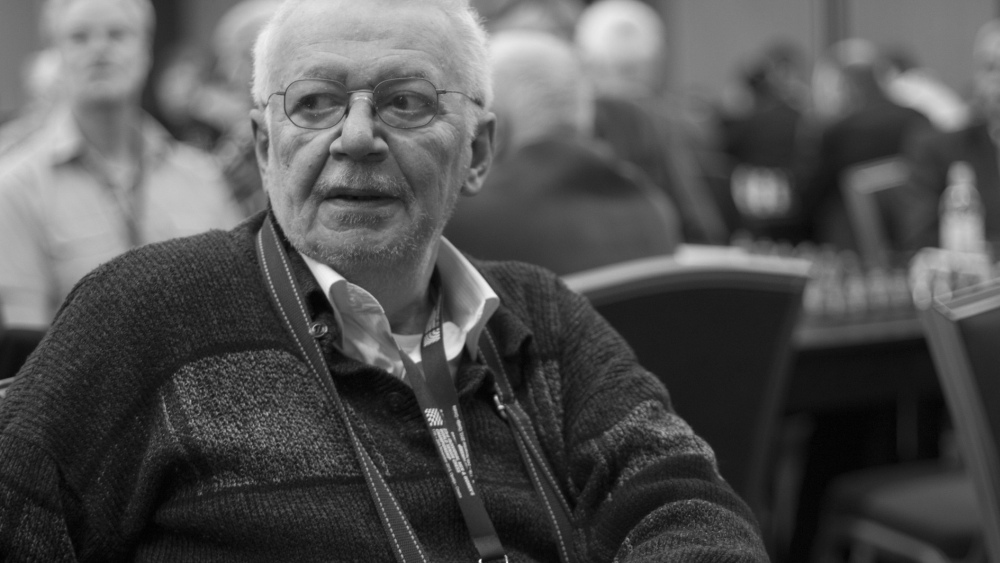
FIDE and the chess world mourn the passing of Romanian Grandmaster Mihai Șuba, a formidable player, an esteemed author, trainer and theoretician. He was 78. Born on June 1, 1947, Șuba began playing chess relatively late. Despite this, his ascent through the ranks was rapid; he earned the International Master title in 1975 and became a Grandmaster in 1978. Șuba’s peak came in the early-mid 1980s. He clinched his first of two Romanian Championship titles in 1980 and 1981 and repeated the feat in 1986. From 1978 to 1986 Mihai played for his native country at five Chess Olympiads. His breakthrough on the international stage came at the 1982 Las Palmas Interzonal, where he finished third—behind Zoltan Ribli and former World Champion Vasily Smyslov—narrowly missing qualification for the Candidates Matches. His most iconic international victory came at the prestigious 1983 Dortmund tournament, where he triumphed ahead of a strong field. Șuba also finished equal first at Prague 1985 and Timișoara 1987. In 1986, he reached his FIDE career-high rating, entering the world’s top 30. Suba’s legacy extends far beyond the board. He was the author of the acclaimed book Dynamic Chess Strategy (1991), a seminal work that challenged orthodox views of classical positional play and emphasized the fluid, evolving nature of advantage. After settling in Spain, Suba developed a close connection with the Valencian Community, where he not only excelled as a player but also contributed significantly to chess education and promotion. FIDE and the global chess family extend their deepest condolences to GM Suba’s family, friends, and students. Photo: Derek Bridges
Preview: FIDE World Cup 2025 – Goa, India
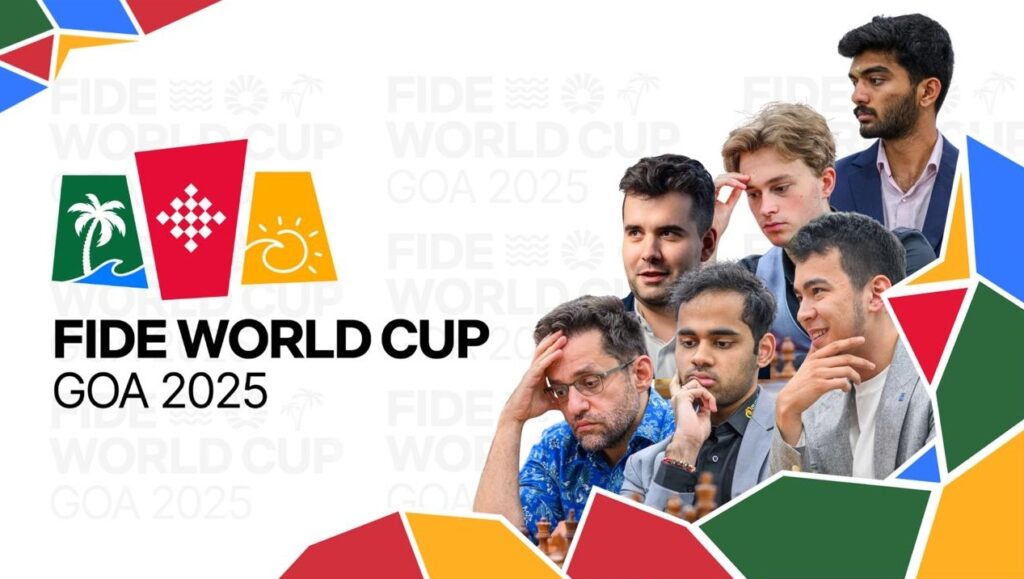
Two hundred and six of the world’s best chess players from more than 80 countries will descend on Goa, India, this week for the 2025 FIDE World Cup, arguably the most important individual chess event of the year. From October 30 to November 27, players will battle through a gruelling knockout format for a share of the USD 2 million prize fund and, more importantly, the three coveted qualification spots for the 2026 FIDE Candidates Tournament — the gateway to the next World Championship match. “India is not just the ancient home of chess; it is a global modern powerhouse. This World Cup is being held here because India is now a central pillar in the global structure of our sport. For the next four weeks, Goa will not just be a coastal paradise; it will be the Colosseum of Chess. This is where legends are forged and broken, and new champions born – a process that has been dramatically enriched by the incredible new generation of Indian stars,” said Arkady Dvorkovich, FIDE President The structure of the World Cup is unique within elite chess. It’s an eight-round, single-elimination knockout event, where each match consists of two classical games played under standard time controls. If the score is tied after those, the players return on the third day for a series of rapid and blitz tie-breaks to decide who advances. The top 50 seeds — comprising many of the world’s highest-rated grandmasters — receive byes into the second round, while the remaining 156 competitors begin their campaigns on the afternoon of November 1st. All games will take place in the Resort Rio, Goa’s largest convention hall and a five-star luxury venue just moments from Baga Beach, offering a fittingly grand stage for one of the most prestigious tournaments on the chess calendar. “I’m really excited and looking forward to playing in the World Cup. Anywhere in India is great of course, but I have some nice memories of Goa as I played some junior events there,” declared Gukesh D, current World Champion, one of the favourites, seeded straight into round two. For the first time since 2002, the FIDE World Cup returns to Indian soil. On that occasion, Viswanathan Anand, the legend from Chennai, defeated Rustam Kasimdzhanov in the two-game final held in Hyderabad, a victory that helped cement India’s emergence as a major force in world chess. More than two decades later, India hosts the event from a position of unprecedented strength. The country now boasts D. Gukesh, the reigning World Champion; Olympiad team titles in both the Open and Women’s sections; and Divya Deshmukh, the current Women’s World Cup winner and the only female participant in this year’s World Cup. Add to that a remarkable generation of rising stars — Arjun Erigaisi, R. Praggnanandhaa, Nihal Sarin, and others — and India’s chess renaissance will be on full display in Goa. At the top of the starting list stand the three Indian superstars, who will be playing on home soil and must be considered the main favourites for the title. Top seed D. Gukesh arrives in Goa in scintillating form, fresh from a 2927 performance at the European Club Cup 2025, where he won gold on board one and played a decisive role in his team’s overall victory. Arjun Erigaisi, though dropping a few rating points in the same event, has been one of the most consistent elite players this year and will be eager to reaffirm his status among the very best. Meanwhile, R. Praggnanandhaa opted to skip the European Club Cup, choosing instead to rest and prepare after a demanding Grand Chess Tour final in Brazil, ensuring he comes to Goa fully recharged. Among the international contenders, Germany’s Vincent Keymer stands out as a major threat. Currently world number four on the live rating list, he gained 18 rating points across the European Club Cup and European Team Championship, where he secured silver on board one, just behind Gukesh. Another clear favourite is Anish Giri, the recent Samarkand Grand Swiss winner. In superb form and with his Candidates qualification already secured, Giri enters the World Cup relaxed but motivated — looking to extend his streak after taking bronze at the European Team Championship. “I’m looking forward to playing the World Cup. It’s a great event and a lot of fun. I’ve played a lot of them, and I was actually very near to qualifying once. Although I played very well that year, I still remember losing a semi-final to Peter Svidler. It’s definitely a very tricky qualification path,” Giri said, after winning in Uzbekistan. The American duo of Wesley So and Levon Aronian can never be ruled out in an event of this nature. Wesley So arrives in Goa on the back of a second-place finish at the U.S. Championship, completing an eleven-game unbeaten run. Renowned for his composure and strength in rapid and blitz formats, So’s consistency and knockout experience make him a formidable contender. Levon Aronian, the 2017 World Cup winner, has also enjoyed a resurgent 2025, collecting multiple titles in prestigious events and finishing third — also unbeaten — at the U.S. Championship. Few players in the field can match his combination of creativity, resilience, and experience under pressure. Among other 2700+ players to watch are China’s Wei Yi, India’s Nihal Sarin, and Hungary’s Richard Rapport. All three have delivered impressive performances in recent months, with Wei Yi continuing his steady return to top form, Nihal showing growing maturity and consistency on the elite stage, and Rapport producing dynamic results throughout October. Each will be eager to make a deep run and claim one of the three coveted qualification spots for the 2026 Candidates Tournament. With such a large field, some strong players will begin their campaigns early and face stiff opposition right from Round One, while the top seeds will enter in Round Two. Excelling in classical chess remains essential, but in this knockout format, tie-breaks — rapid and blitz games played
FIDE World Senior Individual Chess Championship 2025 crosses midpoint
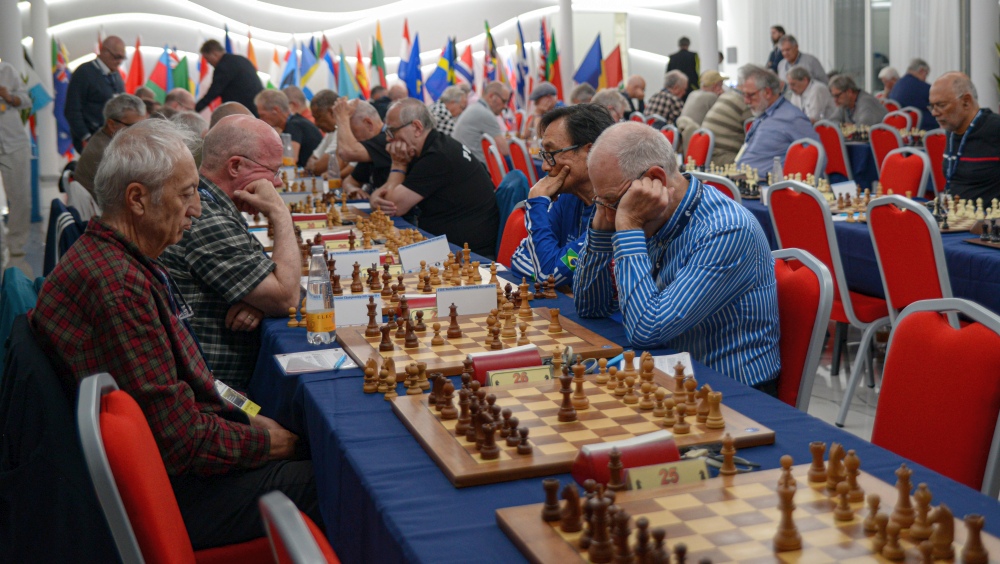
The record-breaking FIDE World Senior Individual Chess Championship 2025 has passed its halfway mark. After six rounds of intense competition in Gallipoli, Puglia, Italy, participants are enjoying a well-deserved day off. The 50+ Open section has featured the fiercest battle for the top spots so far. After six rounds, four Grandmasters – Michal Krasenkow (Poland), Mikheil Kekelidze (Georgia), Rogelio Antonio (Philippines), and Victor Mikhalevski (Israel) – share the lead with 5/6 points. They are closely followed by a large group of eleven players, which includes three of the top seeds, all on 4.5 points. Meanwhile, Alexander Mikhalevski (Victor Mikhalevski’s elder brother) reached the rest day as the sole leader in the 65+ Open tournament, scoring 5.5/6. His position, however, is far from secure, as ten players—including several top seeds—are just half a point behind. The pre-tournament favorites occupy the top positions in the 50+ Women’s section, with Ketevan Arakhamia-Grant (Scotland) leading the field with 5/6. Pia Cramling (Sweden), Masha Klinova (Israel), and Silvia Alexieva (France) trail her by half a point. Galina Strutinskaia (FIDE) has been a dominant force in the 65+ Women’s tournament so far. With a score of 5.5/6, she will head into Round 7 a full point ahead of her closest competitors: Tatiana Bogumil (FIDE), Nona Gaprindashvili (Georgia), and Larisa Khropova (FIDE). With five rounds remaining, all four tournaments remain wide open, promising an exciting finish. Full results and pairings are available on Chess-Results. Official website: worldseniorchampionship2025.com/
European Club Cup 2025 concludes in Rhodes, Greece

A curtain fell on the 40th European Chess Club Cup and the 29th European Women’s Chess Club Cup, held in Rhodes, Greece. SuperChess clinched its maiden title in the Open tournament, while Cercle d’Echecs de Monte-Carlo won its eighth crown in the Women’s section. Heading into the final round, SuperChess held a perfect score and a one-match-point lead over Hungary’s Tuxera Aquaprofit Nagykanizsai Sakk Klub. The two teams clashed for the top spot, with SuperChess needing only a draw to secure the trophy. They emerged victorious with a 3.5-2.5 match score, finishing the tournament with a perfect 14 match points. Alkaloid (North Macedonia) and Novy Bor (Czech Republic) tied for second place with 12 match points each. Alkaloid took the silver medal due to a better Sonneborn-Berger tiebreak. 40th European Chess Club Cup 2025 – Final Standings Cercle d’Echecs de Monte-Carlo (Monaco) claimed its eighth gold medal in the European Women’s Chess Club Cup. Having entered the final round with a perfect score, the team had nearly secured the title regardless of the outcome. After a long and intense fight, they drew their match against the Turkish Airlines sports club, finishing with 13 match points—three points clear of the runner-up. Sirmium Sremska Mitrovica (Serbia) took the silver medal with 10 match points. Three teams tied for third with 9 match points each: Tajfun SK Ljubljana (Slovenia), SuperChess (Romania), and CE Gambit Bonnevoie (Luxembourg). With the best tiebreak, Tajfun SK Ljubljana completed the podium. 29th European Chess Club Cup for Women 2025 – Final Standings The top performers on each board in both sections were recognized for their tournament results. The best individual results (Open section): Board 1: 1. GM Gukesh D; 2.GM Vincent Keymer; 3.GM Anish GiriBoard 2: 1.GM Xiao Tong; 2.GM Wei Yi; 3.GM Ido GorshteinBoard 3: 1.GM Benjamin Gledura; 2.GM Richard Rapport; 3.GM Parham MaghsoodlooBoard 4: 1.GM Nihal Sarin; 2.GM Alexey Sarana; 3.GM Aravindh ChithambaramBoard 5: 1.GM Nils Grandelius; 2.GM Bogdan-Daniel Deac; 3.GM Daniil YuffaBoard 6: 1.GM David Anton Guijarro; 2.GM Puranik Abhimanyu; 3.GM Daniel Dardha The best individual results (Women’s section): Board 1: 1.GM Zhu Jiner; 2.GM Aleksandra Goryachkina; 3.GM Anna UsheninaBoard 2: 1.GM Divya Deshmukh; 2.IM Leya Garifullina; 3.GM Nana DzagnidzeBoard 3: 1.IM Stavroula Tsolakidou; 2.IM Nurgyul Salimova; 3.GM Alexandra KosteniukBoard 4: 1.FM Liwia Jarocka; IM Alina Kashlinskaya; 3.IM Lu Miaoyi During the Closing Ceremony, the Special Awards were presented to: South Aegean Region – for supporting Chess and European Chess Championships City of Rhodes – for supporting Chess and European Chess Championships Chess Club Ippotis – For outstanding organisation of European Chess Championships in Rhodes Hotel Rhodes Palace – For outstanding hospitality and hosting of European Chess Championships in Rhodes Aegean University – ECU Academic Partnership Award ECU Fair Play Award – IM Sebastian Poltorak – Offering a draw to his opponent who needed medical assistance The ceremony took place yesterday evening at the Amalfi Club and Restaurant in Rhodes. Attendees included ECU President Zurab Azmaiparashvili, ECU Vice Presidents Jean Michel Rapaire and Alojzije Jankovic, ECU Tournament Director Petr Pisk, ECU Secretary General Theodoros Tsorbatzoglou, Vice Governor of the South Aegean Region Zisimos Vasileios Delaportas, Vice Mayors of Rhodes Mixalis Pligos and Georgios Patas, Vice President of the Ippotis Chess Club Kambouropoulos, and other distinguished guests who took part in the awards ceremony. Text and photos: European Chess Union Official website: eccc2025.com/ Photo gallery of the event
Winners crowned at 2nd Chess Olympiad for People with Disabilities
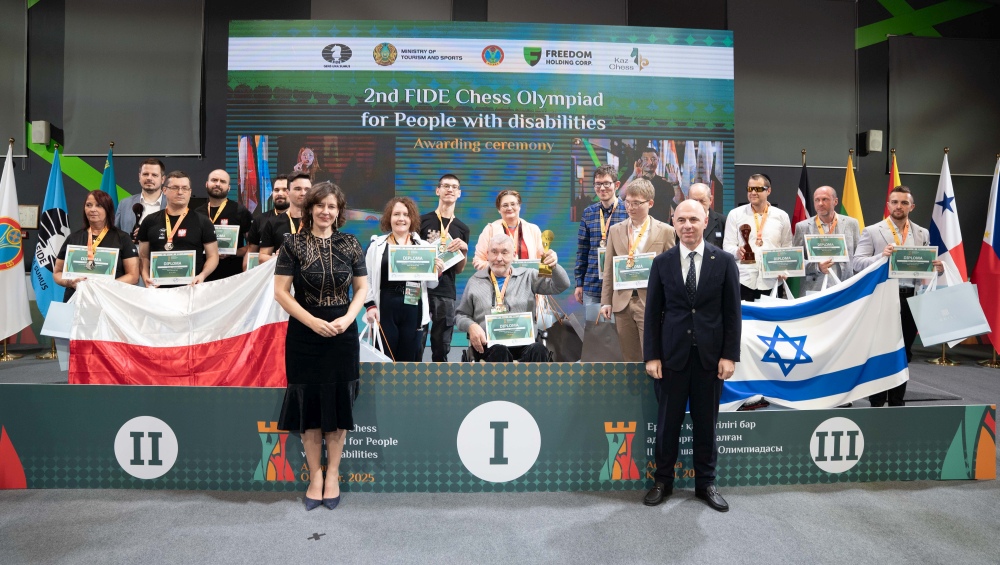
The 2nd Chess Olympiad for People with Disabilities concluded today in Astana, marking a historic celebration of inclusivity, determination, and unity – coinciding with the Republic Day of Kazakhstan. The final day began with a vibrant cultural performance featuring traditional Kazakh dances, music, and local cuisine, creating a festive atmosphere for the participants. The ceremonial first move was made by Andrey Gromov, President of the International Physically Disabled Chess Association (IPCA), together with Gulmira Dauletova, Executive Director of the Kazakhstan Chess Federation (KazChess). “It’s the first time Kazakhstan has organised such an event,” said Gulmira Dauletova. “After hosting the World Cadets Championship just weeks ago, preparing this Olympiad in only 20 days was a huge challenge – but our team worked tirelessly, and we are proud that everything went so well. The players are happy, and that means everything to us.” “Our main goal was to create smiles. Seeing the players enjoy themselves, especially during moments like our ‘Hug Day,’ was the most rewarding part,” she added. A short but powerful history The Chess Olympiad for People with Disabilities has a brief yet inspiring history. It began in 2020 with the first Online Olympiad, which saw 61 teams from 45 countries and nearly 400 players – Poland took gold in that inaugural edition. Three years later, the dream of meeting over the board became reality in Belgrade, Serbia, where 23 teams competed in the first in-person event – Poland once again emerged victorious. This year in Astana, the Olympiad reached a record 34 participating teams, making it the largest and most inclusive edition to date.The story continues: starting in 2026, the Olympiad for People with Disabilities will be held alongside the main Chess Olympiad, beginning in Samarkand, Uzbekistan. “For me, it’s special that chess allows people with all kinds of abilities to compete on an equal footing,” said Dana Reizniece, Deputy Chair of the FIDE Management Board. “Chess is one of the most inclusive sports in the world – and aligning these Olympiads ensures that everyone remains part of the same global chess family.” Thomas Luther, Chairman of the FIDE Commission for People with Disabilities, added: “From next year, the Olympiad for People with Disabilities will take place alongside the main Olympiad and the FIDE Congress – a major step that guarantees the continuity and growth of this event.” Stories of Inspiration Inclusivity in chess extends to every corner of the world. Blessing Jemani, captain of the Zimbabwean team, shared a powerful story about his young student Tinashe Mvududu, who plays chess using his legs.“He teaches us that disability is not inability,” said Jemani. “He’s an inspiration to our entire chess community – and though he couldn’t join us this year, we hope to see him competing next year in Uzbekistan.” Position of the Day The final round delivered thrilling chess moments — notably, the game between Ihar Rasikhin (FIDE 2) and Luisa Fernanda Molina Valdes (Colombia), featuring a brilliant “Greek gift” sacrifice: 26. Bxh7+ Kxh7 27. Qxf7 Qd8?? (after 27…Rxe1! 28. Rxe1 Qc4! White is only slightly better) 28. Qh5+ Kg8 29. g6, and Black resigned facing inevitable checkmate. Awarding Ceremony The closing ceremony was filled with emotion and pride. Dana Reizniece delivered a heartfelt speech, expressing gratitude to all contributors: “The 2nd Chess Olympiad for People with Disabilities has been a true festival of humanity – a magnificent demonstration of the unbreakable spirit of chess. On behalf of FIDE, I would like to express our deepest gratitude to the Government of Kazakhstan and President Kassym-Jomart Tokayev for their continuous support of chess and its development. Our thanks also go to the Akimat of Astana and Mayor Zhenis Kasymbek for their warm hospitality, and to the Kazakhstan Chess Federation and its President Timur Turlov for their exceptional organisation. We are deeply grateful to our partners, Freedom Holding Corporation and all sponsors, for their invaluable support, and to the National Paralympic Centre for providing world-class playing conditions. Finally, heartfelt thanks to the arbiters, fair play team, and volunteers whose dedication ensured everything ran flawlessly.” Team standings The final standings crowned the champions of the 2nd Chess Olympiad for People with Disabilities: 1st Place – FIDE 1 (Babarykin, Ermakov, Lipilin, Zakharova, Obodchuk)2nd Place –Poland (Tazbir, Molenda, Piekielny, Leszner, Wolanski)3rd Place – Israel (Gruenfeld, Streltsov, Gurbanov, Aleksandrova) Full results: chess-results.com Special awards and board winners Special prizes Youngest player with hearing disability: Farkas Virag (Hungary) Youngest player with physical disability: Atassi Celine (USA) Youngest player with visual disability: Kuanyshuly Nurgisa (Kazakhstan 2) Oldest player with hearing disability: Jimenez Moron Elias (Panama) Oldest player with physical disability: Babula Milan (Czech Republic; pictured below) Oldest player with visual disability: Bibikov Yuriy (Kazakhstan 3) Longest chess career (female): Dietsche Birgit (Germany) Best game: Cheyzer Crystal Mendoza (Philippines) Best performance: Maksim Ermakov (FIDE 1) Board winners Outstanding performances were also recognised on each board, highlighting individual excellence throughout the event: Board 1: 1. Amato, Leonel (Argentina) 2. Varadi, Viktor (Hungary) 3. Gruenfeld, Yehuda (Israel) – pictured belowBoard 2: 1. Glazar, Domagoj (Croatia) 2. Pavicevic, Jovan (Serbia) 3. Ermakov, Maksim (FIDE 1)Board 3: 1. Musokeri, Prince (Zimbabwe) 2. Rasikhin, Igor (FIDE 2) 3. Kishan, Gangolli (India)Board 4: 1. Cherono, Mercy (Kenya) 2. Ali Mohamed, Mohamed (Egypt) 3. Salamon, Julia (IBCA)Board 5: 1. Kambarova, Aiganym (Kazakhstan 2) 2. Sarkar, Md Ali Nawaz (Bangladesh) 3. Pavicevic, Jovana (Serbia) Passing the flag to Uzbekistan During the ceremony, Gulmira Dauletova officially handed over the FIDE flag to Askar Ibraimov, Specialist of the Chess Federation of Uzbekistan for the Paralympic direction – symbolizing the transfer of hosting duties to Samarkand in 2026. “How it started years ago – it was a challenge,” said Akaki Iashvili, FIDE Special Tasks Director. “But thanks to the FIDE DIS Commission, KazChess, the government, volunteers, arbiters, and the Fair Play team, we created optimal conditions and a beautiful atmosphere. The journey continues.” With this symbolic moment, the 2nd Chess Olympiad for People with Disabilities officially came to a close – leaving behind unforgettable memories and setting the stage
2025 U.S. Championships: Fabiano Caruana and Carissa Yip defend titles

GM Fabiano Caruana and IM Carissa Yip were crowned U.S. Champions, winning their fourth and third consecutive titles, respectively. The 2025 U.S. Championships (Open and Women’s) were 12-player round-robins with a classical time control and a combined prize fund of $402,000. Held at the upgraded facilities of the Saint Louis Chess Club in St. Louis, Missouri, the tournaments attracted the strongest American players, with the exception of Hikaru Nakamura. The Open competition turned into a thrilling duel between Fabiano Caruana and Wesley So. Despite missing a win in their sixth-round clash, Caruana seized the lead in Round 9 and preserved it to the very end, securing his fifth national title with a score of 8/11. Wesley So finished a half-point behind the champion to take the silver medal. Levon Aronian completed the podium with 6.5/11; all three finished the event undefeated. The Women’s event followed an equally exciting script, with Anna Zatonskih, Carissa Yip, and Alice Lee sharing the lead with just two rounds to go. Yip finished strongly with two victories over Nazi Paikidze and Thalia Cervantes Landeiro to capture her fourth national title. Meanwhile, Anna Sargsyan pulled off two crucial wins over Zatonskih and Lee to claim the silver medal. Irina Krush scored 1.5 points in the final two rounds to secure the bronze. Photos: Saint Louis Chess Club / Lennart Ootes Official website: saintlouischessclub.org/event/2025-us-chess-championships/
2nd FIDE Olympiad for People with Disabilities nears its grand finale
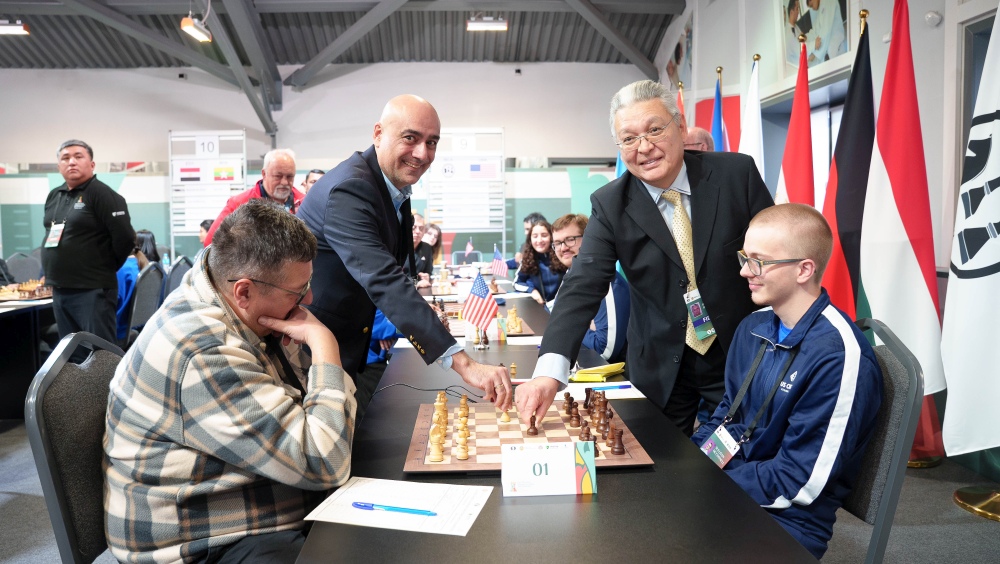
The fifth day of the 2nd FIDE Chess Olympiad for People with Disabilities began with “Inspiration Talks” featuring WGM Dana Reizniece, Deputy Chair of the FIDE Management Board, and GM Thomas Luther, Chair of the FIDE Commission for People with Disabilities. The motivational meeting, held at the New Generation School, brought together children with special needs. The event was jointly organized by FIDE, Kazchess, and the International School Chess Federation (ISCF), with support from the Ministry of Education of Kazakhstan. The speakers shared their personal journeys and insights into how chess can teach resilience, discipline, and creativity. An open discussion followed, where the children asked questions and shared their enthusiasm for the game. GM Thomas Luther said: “It was a wonderful experience to meet so many motivated children. Chess is more than a game – it teaches imagination, concentration, respect, and how to handle both victory and defeat.” Celebrating United Nations Day As play resumed for Round 5, the first ceremonial move was made by: Philip Gardner, President of the International Committee of Silent Chess (ICCD), Berik Balgabaev, Advisor to the FIDE President, Sukhrob Khodzhimatov, Deputy Resident Representative of the United Nations Development Programme (UNDP) in Kazakhstan, and Ardak Yeleussizov, Director of Freedom Bank Astana. The visit of Mr. Khodzhimatov was especially symbolic, coinciding with United Nations Day. He shared:“This movement is truly meaningful. For UNDP, our guiding principle is to leave no one behind. People with disabilities must be treated as full members of society – we must value their power, energy, and initiative. I was deeply impressed by this facility and the happiness of the participants – this is truly a place for everyone.” Young Stars of the Olympiad The Olympiad also celebrates its youngest participants, whose enthusiasm and spirit continue to inspire everyone in Astana. Thirteen-year-old Mikhail Dzenisenia from FIDE Team 2 (pictured below) spoke confidently about his ambitions: “I started playing chess when I was four. Now I want to become a FIDE Master and one day win the World Championship for players with disabilities.” The youngest boy at the Olympiad, 12-year-old Ben Kaufmann from Germany, expressed his joy at playing alongside his father: “It’s very special to be here. We show that everyone is perfect. I play with my dad every day, and chess is a big part of our life.” His father, Thorsten Kaufmann, captain of the German team, added: “Here, everyone is equal on the board – there are no disadvantages. This tournament shows that all people are special, and you should never give up.” Twelve-year-old Celine Atassi from the USA, the youngest girl at the Olympiad, shared what chess means to her: “Chess plays a huge role in my life. I study for several hours every day, and I hope to become an International Master or even a Grandmaster one day.” On the boards At the top tables, Poland and FIDE 1 drew their crucial match, trading blows on boards two and four. Both teams remain in the lead with 9/10 team points. Just behind them are IBCA and IPCA, both on 8/10 points, keeping the race for gold wide open before the final round. Standings after Round 5 can be found on Chess-Results. Position of the Day Today’s instructive position came from the game between Griffin McConnell (USA) and IM Piotr Dukaczewski (IBCA), showcasing the power of active defense and creative counterplay. In a position where White’s rook and two minor pieces should normally overpower the queen, Black found a brilliant idea: 23… b3!! – a dynamic pawn thrust, threatening a double attack after …Qa5. White tried 24. Bd5 Qa5 25. c3, but then came another stunning move: 25… c4!, creating multiple threats. After 26. Bxc4 d5!, White’s bishop was trapped, and the balance tipped decisively in Black’s favor. The rest was a smooth sailing for Black. As the Olympiad reaches its final stages, excitement and tension are rising. The players remain fully focused, yet the atmosphere of team spirit continues to define this unique event. Tomorrow, the final round will decide who takes home the gold – but here in Astana, every participant has already become a winner through their spirit, courage, and love for the game. Official website: dis-olympiad2025.fide.com/
2nd Olympiad for People with Disabilities, Day 4: Inspiration, inclusion, and the power of chess
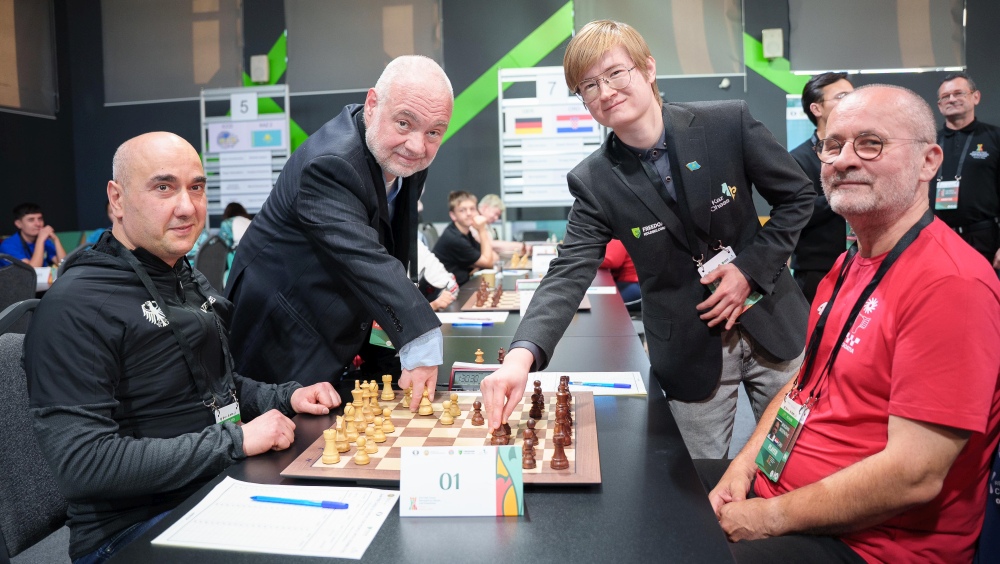
The fourth day of the 2nd FIDE Chess Olympiad for People with Disabilities began with a heartwarming initiative. GM Alisher Suleymenov of Kazakhstan, a bronze medalist at the Asian Championship, hosted a simultaneous exhibition on 12 boards for local children with disabilities at the Paralympic Training Centre. The event was organized by the International School Chess Federation (ISCF), which brought together young players with disabilities to enjoy an inspiring day of chess. “It was a great day! I was very excited to give a simultaneous exhibition against 12 very talented young stars,” said GM Suleymenov. “The games were quite interesting, and I hope this experience helps them grow. I wish them all the best in their chess journeys.” ISCF also organized a friendly online match between children with hearing impairments from Kazakhstan and South Africa — demonstrating how chess can connect and inspire across continents. Following the simul, the fourth round began with the ceremonial first move made by GM Thomas Luther, Chairman of the FIDE Commission for People with Disabilities; Diyar Seitov, Sports Director of the National Paralympic Center; and GM Alisher Suleymenov, fresh from his exhibition. “Inclusive sport is very important – in Kazakhstan and around the world,” shared GM Suleymenov. “I’m really happy to see this movement grow and to meet so many strong players and young talents here.” GM Thomas Luther emphasized the broader meaning of the event: “This Olympiad shows how the world of sports should be – inclusive and open. Every edition grows, and that’s our ambition.” “This beautiful venue shows how chess belongs to both the Olympic and Paralympic families,” he continued. “Chess removes barriers. It’s one of the few sports where everyone – regardless of background or physical condition – can play together on equal ground.” “Even if life gives you challenges, don’t be sad. Keep progressing. Today’s world gives everyone a chance – whether to become a chess master or succeed in any other field. That’s the message of this Olympiad.” Stories of Strength and Resilience Behind every participant stands a story of perseverance, courage, and love for the game. Prince Musokeri from Zimbabwe shared his powerful journey: “I started playing chess as a little boy. I come from a poor background, and this is my first time playing abroad. I’m so happy to finally be here,” he said. “Some years ago, during COVID, I struggled, got addicted to drugs, and lost my way – I was almost killed and even lost my memory. But chess gave me another chance to rebuild myself. Now I play for Zimbabwe, and my dream is to become a Grandmaster and teach others. Chess saved my life.” Jesús Osorio from Panama, who also played in the inaugural Olympiad in Serbia, expressed his deep emotions about returning: “For me, it feels like a dream come true every time. This isn’t just a tournament – it’s a celebration. Win, lose, or draw, everyone is happy, everyone is celebrating chess.” “Chess is everything to me. It’s how I prove myself, how I show I can be equal or even stronger. And it’s a universal language – here we come from all continents, yet we understand each other perfectly.” Jesús also shared a touching detail: “My wife is my lucky charm. She travels with me everywhere and even keeps my lucky pen – the one I used when I held a draw against a FIDE Master in round 1. She takes care of everything, and I’m so grateful for her strength.” These stories capture the essence of the Olympiad – a place where courage meets community, and every move on the board reflects a life story of determination. Standings after Round 4 With two rounds remaining, the race for gold is heating up. Poland and FIDE 1 are leading the standings with a perfect 8/8 team points. Just behind them, the teams from Israel, USA, Philippines, Cuba, IBCA, and IPCA are within striking distance with 6/8 points each. Tomorrow promises thrilling clashes at the top as Poland faces FIDE 1 in a key matchup. You can find the standings after Round 4 and pairings for the next round on Chess-Results. Position of the Day: The beauty of sacrifice Round 4 featured many tense battles, but one game stood out – between Lin Htet Naung (Myanmar) and Arias Cano Iliak Omar (Panama). After a tense middlegame, White achieved a completely winning position and found a brilliant finishing combination: White sacrificed the queen with 27. Qxf6!!, delivering a beautiful checkmate after 27…Bxf6 28. Rxh6+ Nh7 29. Nf7#. The 2nd FIDE Chess Olympiad for People with Disabilities continues to inspire everyone who witnesses it – on and off the board. Every move played is more than strategy; it’s a statement of strength and unity. Official website: dis-olympiad2025.fide.com/
2nd FIDE Olympiad for People with Disabilities reaches its midpoint
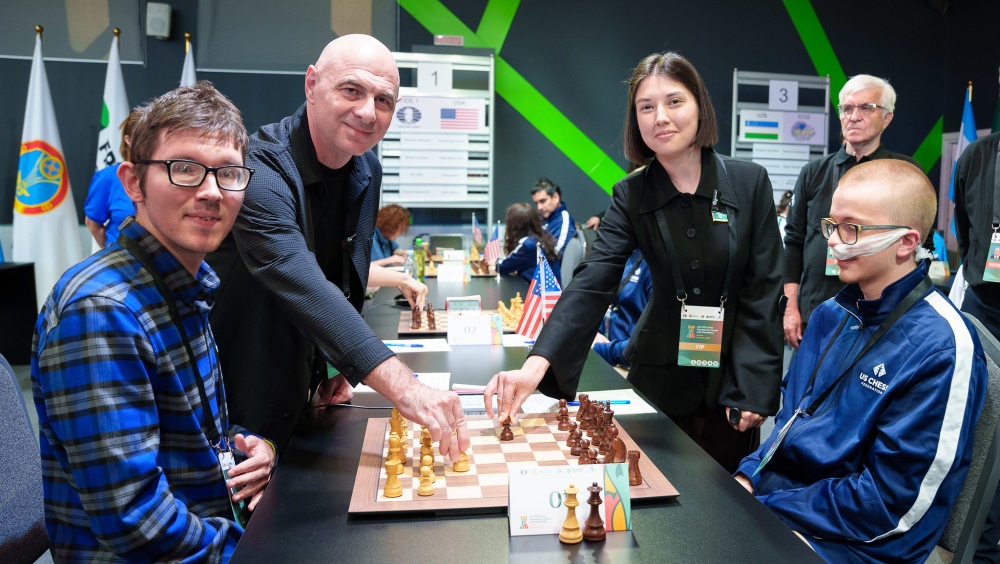
The 2nd FIDE Chess Olympiad for People with Disabilities in Astana has reached its half-way mark – the equator of this inspiring event. With Round 3 underway, the excitement and determination in the playing hall grow stronger each day. The first ceremonial move of the round was made by Dinara Naumova, Member of the Parliament of Kazakhstan, together with Akaki Iashvili, FIDE Special Tasks Director. “Before the first move, I spoke with the contestants – they were positive and confident. The atmosphere is wonderful, and the team spirit is inspiring,” said Dinara Naumova. “It’s an honour for Kazakhstan to host this event. I wish every player success and the strength to never give up. Team spirit makes us stronger.” Her words perfectly captured the spirit of the event – one of unity, resilience, and shared joy. The strength and spirit of the players Every participant at this Olympiad has a remarkable story. For them, every move on the board represents persistence, focus, and the triumph of the human spirit. Luisa Molina, from Team Colombia, shared her joy at being part of this inclusive event: “This Olympiad for People with Disabilities has been one of the best experiences we’ve ever had! This isn’t your usual event – it provides a space for inclusion.” Aryan Joshi from India, a first-time participant, was full of enthusiasm and optimism: “Feeling amazing – this is my first Olympiad for people with disabilities. Despite disabilities, despite the challenges on and off the board, everyone here is giving their best. Everyone is very friendly and very happy. Disability is not something that makes us less – we are differently able, not disabled.” Niloy Chakraborty, a coach for players with hearing impairments and an accompanying person at the event, emphasized the importance of opportunity: “I’ve worked with disabled students for a long time. I’ve shown them tournaments, helped them find opportunities, and organized many events for differently able teams. Here, everyone can participate – and they do, as equals.” Eugenio Campos, representing the IPCA team, coming from Angola, shared how chess became part of his life from a very young age: “This is a well-organized event; it gives us, players with disabilities, the opportunity to play against others from different countries. I thank IPCA, FIDE, and the Kazakhstan Chess Federation. I started chess when I was five – my cousin taught me, and since then, chess has meant a lot to me. Most of my life, I’ve played chess – it’s everything to me.” Another remarkable player of IPCA team is IM Igor Yarmonov from Ukraine, a five-time IPCA World Champion and International Master of both chess and chess composition. His wife and accompanying person, Galina Yarmonova shared: “We are grateful to all the organisers, volunteers, and staff for the wonderful atmosphere in Astana, for the excellent conditions for the players and their companions – everything is of the highest standard! This is our first time at such an Olympiad, and we thank the referees and volunteers for their kind, individual approach to each player.” “Throughout Igor’s life, chess has helped him overcome challenges and see the world – and we are happy to represent this big chess family,” she added. Even after the event, Igor continues contributing to the chess world as a judge for multi-move problems in the FIDE Album – evaluating compositions from around the globe. Inspiration beyond the board Every player finds their own motivation to keep going, and we asked, “Who is your favourite chess player in history?” Answers came quickly and with admiration: Magnus Carlsen, José Capablanca, Garry Kasparov, Anatoly Karpov, Bobby Fischer, and Mikhail Tal were among the most mentioned. But one response stood out. Jesús Osorio from Panama said: “My favourite chess player is not a famous person, but he is a very good chess player – my friend Osvaldo Herrera Graham.” A beautiful reminder that inspiration doesn’t only come from world champions, but also from those who encourage us personally – friends, coaches, and loved ones who share the same passion. The battle for the top Position of the day Today’s Position of the Day came from the exciting battle between Syed Ejaz Husain (Bangladesh) and Ben Kaufmann (Germany). Although Black’s position was slightly worse, they could still defend with 20…Nd6, trading off White’s active knight on f5. Instead, 20…Ne6?? was played, ignoring of White’s mounting kingside pressure. White immediately took advantage with 21. Ne5!, and after 21…Ra6?!, taking no heed of danger, came 22. Qg4 — launching a decisive attack. Black tried 22…Kh7, defeinding h6, but the storm was already breaking. White delivered a stunning blow 23. Nxh6!!, a brilliant sacrifice that ripped open Black’s kingside. After 23…gxh6 24. Qf5+ Kg8 25. Qxf7+ Kh8 26. Ng6#, it was checkmate. This brilliant finish reminds us of one of the great lessons of chess — and life: sometimes, you must take risks and trust your calculation. Evaluating, understanding, and acting with courage can lead to victory both on and off the board. Looking ahead As the Olympiad crosses its midpoint, the energy in Astana continues to rise. Every player here proves that chess is not only a sport of the mind, but a triumph of spirit, inclusion, and shared humanity. The standings after Round 3 and pairings for Round 4 can be found here: Chess Results – 2nd FIDE Chess Olympiad for People with Disabilities Official website: dis-olympiad2025.fide.com/
FIDE President Statement
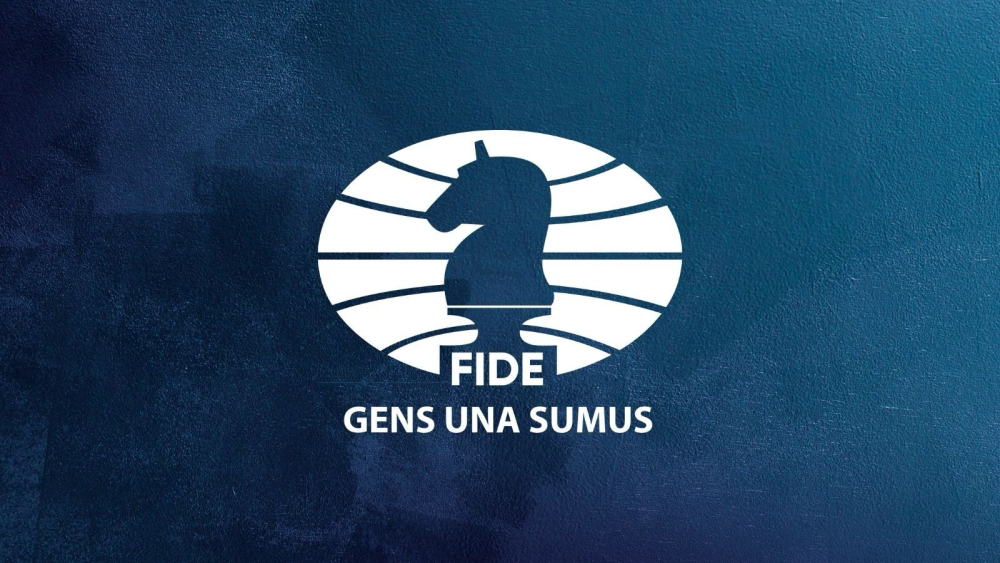
Human life and dignity are fundamental values shared by all of us. While we hold deep respect and love for the game of chess that unites our community, these values must always come first. In recent times, public debate within the chess world has too often moved beyond the boundaries of acceptable, harming not only people’s reputation but their very well-being. When this happens, discussions can turn into harassment, bullying, and personal attacks — a particularly serious concern in today’s environment. The chess community has long respected the achievements of GM Vladimir Kramnik, and his contributions to our sport are undeniable. The same high standards that accompany great achievements, however, also confer a responsibility to uphold the principles of fairness and respect and to be ambassadors for the sport. Therefore, I, along with the FIDE Management Board, will formally refer all relevant public statements made by GM Vladimir Kramnik — both before and after the tragic death of GM Daniel Naroditsky — to the FIDE Ethics and Disciplinary Commission for independent consideration. At the same time, I reaffirm that FIDE will take appropriate action in any case where a lack of respect, public harassment, or bullying is observed within the chess community. We all share responsibility for ensuring that our sport remains a space of integrity, respect, and humanity — values that must always prevail over hostility and division. Arkady Dvorkovich, FIDE President

